| Srl | Item |
| 1 |
ID:
054509


|
|
|
| 2 |
ID:
057445
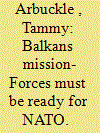

|
|
|
| 3 |
ID:
065589
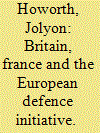

|
|
|
|
|
| Publication |
2000.
|
| Description |
p.33-55
|
|
|
|
|
|
|
|
|
|
|
|
|
|
|
|
| 4 |
ID:
065597


|
|
|
| 5 |
ID:
075727


|
|
|
|
|
| Publication |
2006.
|
| Summary/Abstract |
In September 2006 NATO's role in Afghanistan expanded to cover the whole of the country. With 32,000 troops under NATO command Stage 4 of the International Security Assistance Force (ISAF) represents an open-ended commitment to rebuilding a country long torn by war and instability. The Alliance's showpiece for advanced military transformation, the the NATO Response Force (NRF) represents a down payment on the future of transatlantic military co-operation. Taken together these two developments reflect the reality of NATO's new interventionism of an Alliance that bears little or no resemblance to that which won the Cold War. NATO today is an organisation designed for global reach and global effect, undertaking operations at their most robust. Unfortunately, the re-design of NATO's architecture has not been matched by a parallel development in Alliance military capabilities. NATO's big three, the US, Britain and France, have taken steps to improve their military capabilities. However, the transformation of NATO's other militaries has proved slow and uneven, leaving many members unable to fulfil any meaningful role. Thus, as NATO today plans for both robust advanced expeditionary warfare and stabilisation and reconstruction vital to mission success in complex crisis management environments a gap is emerging. Indeed, in an Alliance in which only the Americans can afford both military capability and capacity most NATO Europeans face a capability-capacity crunch, forced to make a choice between small, lethal and expensive professional military forces or larger, cheaper more ponderous stabilisation and reconstruction forces. This article explores the consequences of the crunch and the implications for NATO's current and future role as the Alliance struggles to find a balance between fighting power and staying power.
|
|
|
|
|
|
|
|
|
|
|
|
|
|
|
|
| 6 |
ID:
057045


|
|
|
| 7 |
ID:
058965


|
|
|
| 8 |
ID:
055338
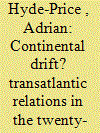

|
|
|
| 9 |
ID:
055634


|
|
|
| 10 |
ID:
019984


|
|
|
|
|
| Publication |
Aug 2001.
|
| Description |
203-210
|
|
|
|
|
|
|
|
|
|
|
|
|
|
|
|
| 11 |
ID:
147223
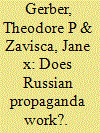

|
|
|
|
|
| Summary/Abstract |
Since the onset of the Ukraine crisis, the Russian government has stepped up efforts to promote a narrative it first introduced in the mid-2000s regarding the faults of the United States and the West; the dangers of institutions associated with democracy, such as protests and NGOs; and the superiority of Russian values and institutions. This narrative comes from official statements, diffuses via government-orchestrated Russian mass media as well as innovations such as internet “troll farms,” and is directed at both domestic and international audiences. Domestically, the arguments seek to legitimize the Putin regime, garner support for its policies, and demonize its critics. Internationally, they are part of a larger effort to project Russian “soft power,” sow doubts and uncertainty within the NATO alliance, weaken public support for policies countering Russian aggression in Ukraine, and solidify the allegiances of Russia's allies in former Soviet republics whom Russia considers part of its natural sphere of influence.
|
|
|
|
|
|
|
|
|
|
|
|
|
|
|
|
| 12 |
ID:
052468
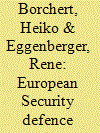

|
|
|
|
|
| Publication |
Dec 2003.
|
| Summary/Abstract |
The article analyzes what the European Security and Defence Policy means for Switzerland's security policy and the Swiss Armed Forces. We assume that in the long run, 'Europe' and the 'European cause' will be the strongest sources for legitimizing the use of force and for beefing up military budgets. However, as no country is able to raise the necessary financial resources on its own, European states will have to find new, innovative ways of pooling their resources and devising concepts of role specialization. The overall consequences of these developments will require politicians and military planners to focus more strongly on the strategic adaptability of the country's armed forces rather than on optimising reform at the operational level. We highlight the consequences for Switzerland by addressing the issue of forging strategic partnerships, adapting armament procurement and overhauling security and military planning processes.
|
|
|
|
|
|
|
|
|
|
|
|
|
|
|
|
| 13 |
ID:
053515


|
|
|
| 14 |
ID:
138790
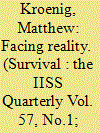

|
|
|
|
|
| Summary/Abstract |
Russia’s annexation of Crimea, invasion of Donbas, and continued threats to Ukraine and other European countries not only menace the stability of the post-Cold War order in Europe, but also pose a fundamental challenge to the assumptions about the strategic environment that have undergirded the NATO alliance for the past quarter of a century.
|
|
|
|
|
|
|
|
|
|
|
|
|
|
|
|
| 15 |
ID:
080323
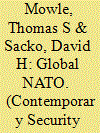

|
|
|
|
|
| Publication |
2007.
|
| Summary/Abstract |
NATO must adapt to the structural imperatives of a unipolar world, or become
increasingly irrelevant. The Global NATO initiative of 2006 would have begun transformation
of NATO into a more flexible, effective, and legitimate organization. The
benefits of NATO globalization are greatest for the United States. Unipolarity means
Downloaded By: [Inst for Defence Studies & Analysis] At: 07:12 18 February 2008
that the United States does not need allies to ensure its security, but the United States
nevertheless receives value from the existence of a pool of capable states whose
equipment and training allow them to operate together. Unipolarity means that
other states will be more likely to bandwagon with the United States than to
balance against it; laundering that cooperation through an institution can enhance
those other states' influence. A NATO expanded to include states that share
common interests with the United States, acting in more flexible coalitions rather
than always as a whole, would meet these goals. It would also be more effective
and legitimate as an organization, since it would include greater military resources
from a more diverse collection of countries
|
|
|
|
|
|
|
|
|
|
|
|
|
|
|
|
| 16 |
ID:
055339


|
|
|
| 17 |
ID:
065588
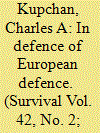

|
|
|
|
|
| Publication |
2000.
|
| Description |
p.16-32
|
|
|
|
|
|
|
|
|
|
|
|
|
|
|
|
| 18 |
ID:
065605


|
|
|
| 19 |
ID:
063571


|
|
|
|
|
| Publication |
May-Jun 1985.
|
|
|
|
|
|
|
|
|
|
|
|
|
|
|
|
| 20 |
ID:
076518
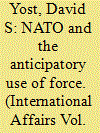

|
|
|
|
|
| Publication |
2007.
|
| Summary/Abstract |
Only since the end of the Cold War, and particularly since September 2001, have questions of anticipatory action arisen in alliance deliberations concerning the use of force. In initiating their Balkan operations, it should be recalled, the allies did not face direct threats, but intervened toterminate conflicts and human rights abuses and to shape their security environment. It has been difficult for the alliance to get to grips with the new security challenges presented by terrorism and the proliferation of weapons of mass destruction because of its history, its intrinsic character, and the nature of the new security challenges. Its history includes a strictly reactive posture during the Cold War and its interventions from a position of overwhelming superiority in the Balkan conflicts. The new security challenges place under stress the alliance's intrinsic character as a permanent coalition of sovereign independent states committed to collective defence because these challenges may endanger specific allies to differing degrees (in contrast with the overarching Soviet threat during the Cold War) and revealdiff erences in interests, capabilities and strategic cultures among the allies. The allies have not yet resolved questions concerning the legality and legitimacy of the antici patory use of force, nor have they fully explored the implications of concepts such as `constructive abstention' and `NATO in support' with regard to preemptive or preventive operations undertaken by a group of allies.
|
|
|
|
|
|
|
|
|
|
|
|
|
|
|
|